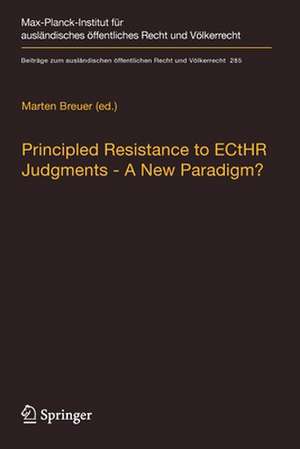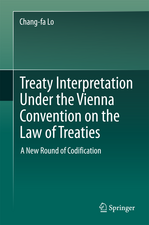Principled Resistance to ECtHR Judgments - A New Paradigm?: Beiträge zum ausländischen öffentlichen Recht und Völkerrecht, cartea 285
Editat de Marten Breueren Limba Engleză Paperback – 14 aug 2020
The book analyses the position of the ECtHR which has been more and more confronted with criticism coming from the national sphere, including the judiciary. This culminated in constitutional court judgments declaring a particular ECtHR judgment non-executable, for reasons of constitutional law. Existing scholarship does not differentiate enough between cases of mere political unwillingness to execute an ECtHR judgment and cases where execution is blocked for legal reasons (mainly of constitutional law nature). At the same time, the discussion under EU law on national/constitutional identity limiting the reach of the former has been only loosely linked with the ECHR context. This book presents a new dogmatic concept - 'principled resistance' - to analyse such cases. Taking up examples from the national level, it strives to find out whether the legal reasoning behind 'principled resistance' shows enough commonalities in order to qualify such incidents as expression of a 'new paradigm'.
| Toate formatele și edițiile | Preț | Express |
|---|---|---|
| Paperback (1) | 784.79 lei 6-8 săpt. | |
| Springer Berlin, Heidelberg – 14 aug 2020 | 784.79 lei 6-8 săpt. | |
| Hardback (1) | 790.77 lei 6-8 săpt. | |
| Springer Berlin, Heidelberg – 31 iul 2019 | 790.77 lei 6-8 săpt. |
Din seria Beiträge zum ausländischen öffentlichen Recht und Völkerrecht
- 15%
 Preț: 655.20 lei
Preț: 655.20 lei - 15%
 Preț: 703.16 lei
Preț: 703.16 lei -
 Preț: 403.15 lei
Preț: 403.15 lei - 23%
 Preț: 843.57 lei
Preț: 843.57 lei - 23%
 Preț: 849.36 lei
Preț: 849.36 lei -
 Preț: 504.24 lei
Preț: 504.24 lei -
 Preț: 479.03 lei
Preț: 479.03 lei -
 Preț: 383.71 lei
Preț: 383.71 lei - 15%
 Preț: 443.64 lei
Preț: 443.64 lei -
 Preț: 502.11 lei
Preț: 502.11 lei - 15%
 Preț: 443.96 lei
Preț: 443.96 lei -
 Preț: 492.96 lei
Preț: 492.96 lei -
 Preț: 488.45 lei
Preț: 488.45 lei -
 Preț: 502.49 lei
Preț: 502.49 lei - 23%
 Preț: 848.02 lei
Preț: 848.02 lei - 15%
 Preț: 453.30 lei
Preț: 453.30 lei -
 Preț: 493.47 lei
Preț: 493.47 lei - 15%
 Preț: 448.85 lei
Preț: 448.85 lei - 15%
 Preț: 452.29 lei
Preț: 452.29 lei -
 Preț: 490.18 lei
Preț: 490.18 lei - 15%
 Preț: 451.32 lei
Preț: 451.32 lei -
 Preț: 494.98 lei
Preț: 494.98 lei - 15%
 Preț: 499.86 lei
Preț: 499.86 lei - 15%
 Preț: 447.71 lei
Preț: 447.71 lei - 15%
 Preț: 469.31 lei
Preț: 469.31 lei - 23%
 Preț: 849.81 lei
Preț: 849.81 lei - 13%
 Preț: 636.05 lei
Preț: 636.05 lei - 15%
 Preț: 473.34 lei
Preț: 473.34 lei - 18%
 Preț: 858.76 lei
Preț: 858.76 lei -
 Preț: 495.58 lei
Preț: 495.58 lei -
 Preț: 408.74 lei
Preț: 408.74 lei - 15%
 Preț: 475.28 lei
Preț: 475.28 lei - 15%
 Preț: 473.99 lei
Preț: 473.99 lei -
 Preț: 512.73 lei
Preț: 512.73 lei - 15%
 Preț: 602.71 lei
Preț: 602.71 lei - 23%
 Preț: 852.03 lei
Preț: 852.03 lei - 15%
 Preț: 678.83 lei
Preț: 678.83 lei -
 Preț: 356.66 lei
Preț: 356.66 lei - 18%
 Preț: 756.82 lei
Preț: 756.82 lei - 15%
 Preț: 640.70 lei
Preț: 640.70 lei - 15%
 Preț: 588.24 lei
Preț: 588.24 lei - 18%
 Preț: 1167.51 lei
Preț: 1167.51 lei - 18%
 Preț: 830.46 lei
Preț: 830.46 lei - 15%
 Preț: 704.32 lei
Preț: 704.32 lei
Preț: 784.79 lei
Preț vechi: 957.06 lei
-18% Nou
Puncte Express: 1177
Preț estimativ în valută:
150.19€ • 155.15$ • 124.99£
150.19€ • 155.15$ • 124.99£
Carte tipărită la comandă
Livrare economică 26 martie-09 aprilie
Preluare comenzi: 021 569.72.76
Specificații
ISBN-13: 9783662589885
ISBN-10: 3662589885
Pagini: 352
Ilustrații: XVIII, 352 p. 3 illus.
Dimensiuni: 155 x 235 mm
Greutate: 0.52 kg
Ediția:1st ed. 2019
Editura: Springer Berlin, Heidelberg
Colecția Springer
Seria Beiträge zum ausländischen öffentlichen Recht und Völkerrecht
Locul publicării:Berlin, Heidelberg, Germany
ISBN-10: 3662589885
Pagini: 352
Ilustrații: XVIII, 352 p. 3 illus.
Dimensiuni: 155 x 235 mm
Greutate: 0.52 kg
Ediția:1st ed. 2019
Editura: Springer Berlin, Heidelberg
Colecția Springer
Seria Beiträge zum ausländischen öffentlichen Recht und Völkerrecht
Locul publicării:Berlin, Heidelberg, Germany
Cuprins
Part I.- Theoretical Framework.- ‘Principled Resistance’ to ECtHR Judgments: Dogmatic Framework and Conceptual Meaning.- Resistance to the European Court of Human Rights: The Institutional and Sociological Consequences of Principled Resistance.- Part II.- National Perspectives.- Principled Resistance to and Principled Compliance with ECtHR Judgments in Germany.- ‘Principled Resistance’ to ECtHR Judgments in Austria.- Judicial Disobedience and the ECtHR: The Italian Case.- Resistance in Switzerland: Populist Rather Than Principled.- Principled Criticism and a Warning from the ‘UK’ to the ECtHR?.- The Execution of ECtHR Judgements and the ‘Right to Object’ of the Russian Constitutional Court.- Part III.- International Perspectives.- The Perspective of the Venice Commission.- The National Identity Criterion in the Crossfire Between European Integration and the Preservation of National Sovereignty.- ‘Principled Resistance’ to ECtHR Judgments: An Appraisal.
Textul de pe ultima copertă
The book analyses the position of the ECtHR which has been more and more confronted with criticism coming from the national sphere, including the judiciary. This culminated in constitutional court judgments declaring a particular ECtHR judgment non-executable, for reasons of constitutional law. Existing scholarship does not differentiate enough between cases of mere political unwillingness to execute an ECtHR judgment and cases where execution is blocked for legal reasons (mainly of constitutional law nature). At the same time, the discussion under EU law on national/constitutional identity limiting the reach of the former has been only loosely linked with the ECHR context. This book presents a new dogmatic concept - 'principled resistance' - to analyse such cases. Taking up examples from the national level, it strives to find out whether the legal reasoning behind 'principled resistance' shows enough commonalities in order to qualify such incidents as expression of a 'new paradigm'.
Caracteristici
Gives a prime example on backlash against international courts and tribunals Concentrates on dogmatic concepts behind 'principled resistance' Benefits from thorough analysis of national case law Links so-far disconnected discussions under EU law and Convention law






















